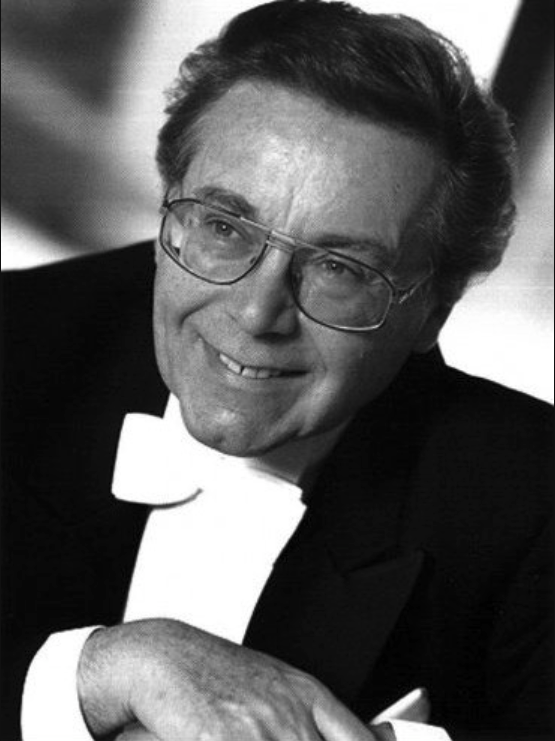Léonie Sonning Prize 2002
The Austrian pianist Alfred Brendel received the Léonie Sonning Music Prize of 500,000 Danish kroner at a concert on Saturday 26 January 2002 at the Tivoli Concert Hall.
The prize was presented by the pianist Amalie Malling, a member of the Léonie Sonning Music Foundation’s board, who addressed Brendel with the following words:
‘With your enormous abilities as a pianist, your searching intelligence and your enormous urge to explore, you have succeeded in penetrating deeper into music while at the same time illuminating it from within. You experiment with the instrument, you develop, you renew, you rediscover your repertoire. But the absolute essence of music is always paramount for you, and you transfer this essence to us, your audience.’
citation
The 2002 Léonie Sonning Music Prize of 500,000 Danish kroner is awarded to Alfred Brendel for his lifelong exploration and interpretation of the piano’s core repertoire. With his far-sighted overview, his searching intelligence and his unparalleled sense of sound, he has emerged as one of the most important communicators of his generation, especially of the Viennese Classical repertoire. He is, at once, a significant heir and pioneering innovator of the central European piano tradition.’
You can listen to Amalie Malling’s speech and Alfred Brendel’s acceptance of the award here (in German):
The programme
Igor Stravinsky Symphony in three movements
Mozart Piano Concerto no. 25 in C major
Interval – with the awarding of the Léonie Sonning Music Prize
Beethoven Piano Concerto no. 5 Emperor
Performed by:
Alfred Brendel, piano
The Royal Danish Orchestra
Conductor: Michael Schønwandt
Alfred Brendel in Denmark
As a young pianist, Alfred Brendel played the complete Beethoven piano sonatas at the Odd Fellow Palace in Copenhagen. Since that time he has performed several times in Denmark, both at solo concerts and as a soloists with the Danish National Symphony Orchestra, Tivoli Symphony Orchestra (Copenhagen Phil) and Aarhus Symphony Orchestra. In connection with the prize, Brendel stated at a press conference that he felt a strong sense of friendship when in Denmark. He also stated his pride at joining a list of Sonning Prize laureates including Stravinsky, Bernstein, Shostakovich and Britten. ‘Without them, I would be nothing. It is their light I throw back when I play,’ he said.
The daily press wrote, among other things:
Brendel was met with towering expectations, and they were surpassed. When he plays Mozart, it is on Mozart’s terms. He enriches the experience of this music by exposing its depths. Brendel pays homage to his own principle that it is the work that shows the musician how to play it, rather than the musician showing what the work might be or how the composer should have written it. In other words, he is an immensely humble musician, devoid of whims. He phrased so sensitively that even Mozart would probably have had tears in his eyes. In her presentation, Amalie Malling highlighted Brendel’s sonorous sense and sensitive intelligence – yes, I second that.
(Jakob Wivel, Børsen)
It was not an Emperor Concerto built of bombast, but on nuance, whose exemplary balance uncovered as many different facets of expression as possible. Brendel could start a phrase faintly, and it could go on to encompass delicate silver and imposing weight. He rendered the solo voice in Beethoven’s most extrovert and demonstrative piano concerto an experience felt without bragging or playing the extrovert. On the contrary, the soloist gathered the orchestra around him with almost immobile authority. It is a pair of formidable pianistic hands that are attached to this musician’s brain.
(Thomas Michelsen, Politiken, 28 January 2002)
Alfred Brendel plays these concertos as if he were improvising them for the first time, even though he must have performed them hundreds of times. The music flows between his hands. Subtle colours – a sparkling run that suddenly hesitates before reaching its climax; a phrase that shuts itself in and recoils – all of these give known passages unexpected perspectives and evoke smiles in the otherwise concentrated face. Compassionate, imaginative, exuberant but at the same time self-effacing and humble, Brendel recreates these Classical works so that the thoughts and feelings of the masters are congenially conveyed. But one should not mistake this spontaneity. It is not capricious or random, but engraved in the interpretation. Michael Schønwandt and the Royal Danish Orchestra were familiar with the many nuances, prepared them expectantly and participated in them with joy. It was not just the piano playing, but the eminent interaction of soloist and orchestra that was tuned to the finest rhythmic and sonorous details.
(Jens Brincker, Berlingske Tidende, 28 January 2002)





